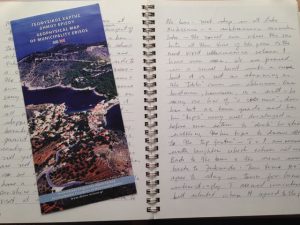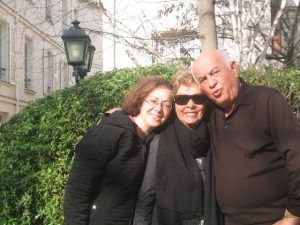In The News
The Indiscernible Tagline
During last year’s federal election campaign in Canada, I received a direct mail piece that I thought flouted the principles of transparency.
After filing a complaint and an extended correspondence with a representative from the Office of the Commissioner of Canada Elections, I knew that the leaflet met the letter of the regulations. I was adamant that it did not meet the spirit of them.
This is a copy of the letter I mailed today to The Honourable Maryam Monsef asking that she initiate a process to amend the regulations pertaining to the tagline on campaign materials.
August 24, 2016
The Honourable Maryam Monsef
Minister of Democratic Institutions
Centre Block, Suite 546S
House of Commons
Ottawa, Ontario
K1A 0A6
Dear Ms. Monsef,
Please accept my belated congratulations on your successful election as a Canadian Member of Parliament and on your subsequent appointment to Cabinet as the Minister of Democratic Institutions.
Last year’s election campaign was a long one and, on occasion, bitterly fought. In Canada, the integrity of the general voting system is upheld by its overall structure as well as the regulations and operational details of which it is comprised.
While your main focus now is on electoral reform, I would like to draw your attention to a flaw in the regulations of the Canada Elections Act (Act) that pertain to the tagline in campaign marketing materials.
During last year’s federal election campaign, I received many direct mail pieces. There was one in particular that I found objectionable. While the mailer met the requirements of the regulations, it clearly contravened the intent and the spirit of the rules. I have enclosed the original mailer for your reference.
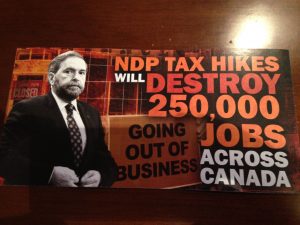 I filed a complaint about this particular mailer, via an online form, on October 9, 2015. My complaint read as follows:
I filed a complaint about this particular mailer, via an online form, on October 9, 2015. My complaint read as follows:
I received a piece of campaign literature today which is national in scope. It does not clearly identify the sender, the political party, or the official agent. Furthermore, it does not even identify the name of the local candidate in my riding. This appears to me to violate the guidelines, at the very least in spirit, for advertising material. Depending on who paid the costs of production & distribution, it may also violate financing guidelines. (9 October 2015)
The response I received was that the mailer met the requirements of the regulations. Specifically, the email dismissed my concerns as follows:
Thank you for your message of October 9, 2015 with respect to the election advertising leaflet that was distributed in your riding.
The Canada Elections Act (Act) requires that a candidate or registered party who runs an election ad mentions in or on the message that its transmission was authorized by the candidate’s official agent or by the party’s registered agent. The Act is silent as to the size, colour or placement of that mention, which is referred to as the “tagline”. I would draw your attention to the bottom right of the page showing Thomas Mulcair, under the word “Canada” where the following statement appears: “Authorized by the registered agent of the Conservative Party of Canada”. The tagline does appear and provides the information required by the act. (11 October 2015)
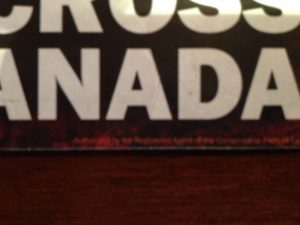 As you can see for yourself, the tagline is barely discernible. I struggled to decipher what it said. It would have been impossible for many to even know that a tagline had been included.
As you can see for yourself, the tagline is barely discernible. I struggled to decipher what it said. It would have been impossible for many to even know that a tagline had been included.
I was not satisfied with the response and had further correspondence with an agent from the Office of the Commissioner of Canada Elections. After sending him a scanned copy of the direct mail piece, I received this response:
Good morning Ms. Faris:
I am familiar with the literature you forwarded me. We had previously reviewed it and as you noted the tag line is included on the ‘Mulcair’ side of this literature. It does state that the political advertising is authorized by the registered agent for the Conservative Party of Canada. Generally speaking, the Act does not control the content of election advertising (or the font size for the authorization line), but regulates the reporting of associated expenses and requires that an authorization statement appear on the advertising.
The literature you received is an initiative from the Conservative Party of Canada and an expense of this political party. It is not associated with the local Conservative Party of Canada candidate in your electoral district.
Hoping this clarifies this matter … (14 October 2015)
I did not find the response satisfactory and wrote again:
It clarifies matters, but does not resolve my complaint.
Here’s the thing: a tagline is meant to identify the sender. If it is virtually impossible to read, then it defeats the purpose. Just having it there is not enough. It respects the letter of the regulation, but does not satisfy the intent.
Similarly, if benefits accrue to the local candidate, then a portion of the costs must be assigned to them even if those expenses are recorded as an in-kind donation.
I’d like to know what steps I should pursue now to continue the examination of this issue. (14 October 2015)
The agent tried to address my concerns and the last note I received was as follows:
Section 320 of the Canada Elections Act (Act) is clear:
Message must be authorized
320. A candidate or registered party, or a person acting on their behalf, who causes election advertising to be conducted shall mention in or on the message that its transmission was authorized by the official agent of the candidate or by the registered agent of the party, as the case may be.
This matter has been reviewed previously. It is clear that this election advertising (literature) is distributed and paid for by the Conservative Party of Canada – thus the tag line of authorized by the Registered Agent for the Conservative Party of Canada. The tag line may be difficult to read, however the Act does not regulate the content of the advertising other that what is noted in Section 91 of the Act:
Publishing false statements to affect election results
91. No person shall, with the intention of affecting the results of an election, knowingly make or publish any false statement of fact in relation to the personal character or conduct of a candidate or prospective candidate.
It may be noted that national advertising by a Party (any political party) may benefit a local candidate. It may also be argued that advertising by a candidate may benefit a Party. Almost every advertising generated by a candidate will include their party’s logo.
In reviewing this matter, the Office of the Commissioner of Canada Elections is satisfied that the required information is contained on the advertising being discussed and its expense will be reported by the Party. With regards to your complaint, we have reviewed the information you have provided and concluded that the circumstances as described do not appear to contravene any provisions of the Act, and as such, cannot be pursued by this Office. (14 October 2015)
Despite the best efforts of the representative from the Commissioner’s Office, I still believe that this direct mail piece stretched the limits of the regulations to the point of absurdity. It is not enough to simply include a tagline; it must be legible and clearly identifiable. I also believe that the local candidate’s name should appear on any directly distributed material since Canadians vote for Members of Parliament, not for party leaders.
 Minister Monsef, I urge you to initiate a process to review and amend the regulations of the Act that deal with the tagline and the identity of the sender. Such details are critical; they underpin the integrity of Canada’s voting system, whether as currently constituted or as altered for future elections.
Minister Monsef, I urge you to initiate a process to review and amend the regulations of the Act that deal with the tagline and the identity of the sender. Such details are critical; they underpin the integrity of Canada’s voting system, whether as currently constituted or as altered for future elections.
Thank you for your consideration of this matter and I look forward to amended regulations which uphold the principles of transparency and integrity for election campaign materials.
Sincerely yours,
Reema Faris
cc.
Marc Mayrand, Chief Electoral Officer of Canada, Elections Canada
Commissioner of Canada Elections
Pamela Goldsmith-Jones, Parliamentary Secretary to the Minister of Foreign Affairs
A Life In Script
I feel the absence of my mother most keenly when I catch a glimpse of her writing.
When I look at the carefully crafted words and sentences she moulded; the ones she wrote down. An alchemy of thought, energy, effort, pen, and paper.
Mom used writing to express her thanks. To scold political leaders. To extend congratulations. To advocate for causes. To nurture connections.
She cherished the handwritten note even after her grandsons helped her learn to use email.
My mother believed there was a personal quality to a handwritten note that was impossible to replicate in type form. I agree. Each stroke of the pen captures a person’s personality, their character, history, and experience. The way in which hand-written words create a web of meaning is the most affirmative statement of “I am here”. When I catch sight of my mother’s writing script I wonder how it is that she is not here.
How can the person whose heart propelled the pen across the page not be here to cross that t and dot that i?
I feel the absence of my mother most keenly when I see her writing, with an intake of breath and a vise clamped around my heart.
My mother’s script is from an earlier era when education had not been commodified and contorted. When it was a gift to learn. A time when writing was valued not only for its content but for its form. When penmanship spoke of culture and education and, yes, privilege.
That script, her unique cursive style, is undeniably and uniquely my mother, Yulanda.
I feel the absence of my mother most profoundly when I stare at her writing.
René Descartes said, “I am thinking, therefore I am.” My mother’s cursive script says, “I wrote, therefore I have been.” And as the ability to recall her physical presence becomes the dream of time lapsed, her writing will remain forever real and tangible.
As her daughters, her children, and perhaps someday her grandchildren and descendants, we will carry her DNA forward in time. However, her letters, the drafts of her speeches, the thank-you cards, her recipes, the quotations she noted down, her signature — like the one in the volume of William Shakespeare’s collected works that she used for her studies at McGill — these all serve as a testament to her personal spirit.
No other hand shaped those words, no other mind developed those ideas, no one else forged those connections: letter to letter, person to person, heart to heart.
I feel the absence of my mother most keenly when I catch a glimpse of her writing. The words and sentences that flowed from the pen she held, the pen she guided into forever.
In the year and months since my mother died (and a month before what would have been her 79th birthday), my family has cried, laughed, and celebrated birthdays, anniversaries, graduations, and weddings. We’ve attended funerals. We’ve had time at home, we’ve been away together and separately. Time has carried us forward. It is life’s imperative.
And she, my mother, has been there with us. In each moment, in each thought, in each word.
She always will be.
“If we danced more and sang more, we’d be happier people.”
Yulanda M. Faris
July 2, 1937 – April 23, 2015
With Labour Peace And A Four-Year Horizon
The results may be unofficial, but they are in.
My congratulations to Carolyn Broady, Dave Stevenson, Nicole Brown, Sheelah Donahue, and Pieter Dorsman: the newly elected West Vancouver Board of Education.
With a new mandate of four years and with the campaign behind them, this group of Trustees can now focus on the key priority which is to ensure that our public education system in West Vancouver continues to be one of the best, not only in British Columbia but across Canada.
We are so fortunate in West Vancouver. Not to deny that we too have vulnerable populations and significant needs here, but we are an economically affluent community and one which benefits from the support offered by parents, residents, and businesses. As I’ve often said, it’s not a surprise that we have a graduation rate of 99% in West Vancouver; anything less would be a scandal.
As a school district, we also have an accomplished team of leaders and educators working on behalf of our students and our community — a team recognized for their innovative practices as well as their commitment to excellence. Their efforts are matched by the hard work and diligence of all the district’s employees.
And yet I’m apprehensive.
Because there are pressures on the public education system from which even West Vancouver will not be immune.
The most significant pressure which this Board will face, as with all Boards across the province, is the issue of funding. While West Vancouver has been able to develop other sources of revenue, whether via academies, specialized programs, or international student enrolment, the amount raised may keep annual deficits at bay, but it does not fix the structural deficit upon which our system is based. There are cracks in the foundation.
There’s also a question in my mind as to what the provincial government’s intent may be with regard to both the governance structure and the bargaining structure. I’m worried about consultations which may appear to be based on consensus and which in fact are not.
With the election of a new Board and with one more public Board meeting to attend, I will be entering a new phase. I will now be a former Trustee, but that won’t make me any less committed to the cause of public education, whether in West Vancouver or throughout British Columbia. I will continue to play a part as an interested observer and passionate parent-advocate. To find out more about my plans, please check out EducationForBC.com and the information posted there.
With regard to School District 45, my top three issues for the new Board, in addition to continued advocacy at the provincial level, are: (1) to build and enhance relationships within the district; (2) to ensure the continued prominence of the arts and humanities in all our schools while exploring and expanding new opportunities for students; and, (3) to work towards smaller class sizes as well as enhanced support for students including advanced learners, children with special needs, and English Language Learners.
With a longer mandate and labour contracts in effect until 2019, there’s time and stability within the public education system for this Board to do its very best.
I’m counting on them as are all the members of our community, all our education partner groups, and, most importantly, all our students.
My appreciation to all the candidates who so generously and graciously put their names forward for consideration and my congratulations again to each of the newly elected and re-elected Trustees. Thank you in advance for your diligence, your hard work, and your passionate commitment to public education in West Vancouver.
Make Your Own Choices This November
Here are the speaking notes from my presentation to a gathering of West Vancouver electors this morning about West Vancouver Citizens For Good Government (WVCGG) and the list of Council candidates which they’ve endorsed. These comments are not an exact transcript – they represent the structure, spirit, and intent of my remarks. I’ve made minor edits to the text prior to posting.
- Introduce self.
- What, in your view, is the biggest concern with local municipal elections?
- prompt for low civic engagement and low voter participation
- In 2011, only 23.7% of eligible voters in West Vancouver cast a ballot for councillors.
- With such low turnouts, it is helpful to have individuals and groups who support civic engagement and who try their best to increase voter participation.
- People like this morning’s host. There is one group in West Van in particular which plays a central role in local elections. Do you know which group that is?
- prompt for WVCGG
- When I say West Vancouver Citizens for Good Government, what’s your impression of how many people are involved with the group?
- According to the last census of 2011, West Vancouver has a population of about 43,000 people. According to information about the last election, also 2011, there were 30,754 eligible electors in West Vancouver.
- How many members do you think there are in WVCGG?
- At the October 22 meeting to endorse candidates, the Board of Directors — 16 people — put forward their recommendation and 140 members voted. That’s less than .5% of eligible electors.
- What are the challenges you see with this situation?

- So what is WVCGG?
- founded 1972
- their info says they are a “non-profit, non-partisan, and non-issue community group”.
- interest in ensuring that qualified individuals run for office and to increase voter engagement
- they interview candidates – but don’t post the questions they ask and deliberations are secret
- they hold a public all candidates meeting open to all West Van voters which is great
- and they endorse candidates – but they don’t say why
- once they’ve endorsed candidates, they accept funds from each and with that money conduct extensive advertising which includes a direct mail drop to each residence, something out of the reach of individual candidates — unless they decide to spend some serious money
- You can start to see why this might be a bit of a problem. Here’s the bigger issue.
- At the WVCGG endorsement meeting, the Board of Directors presents its recommendations prior to members voting. In essence what this does is create a situation where the members are voting on the Board of Directors recommended slate and not voting on the individual candidates.
- As former school Trustee Barry Lindahl says — Barry was voted for by the members despite not being put forward as a selection of the Board but that’s rare and proves the exception not the rule — as Barry says, the WVCGG process essentially becomes not about who is best, but who is blessed.
- When I ran in 2011, I was endorsed by WVCGG and I also remember writing a letter in support of them to the North Shore News. But I cannot support the list of endorsed candidates this year although I may support some of the individual candidates on the list because the list of endorsed candidates is very troubling to me.
- Here’s why?
- out of 6 endorsements for council only one is female this is despite the fact that there are more women living in West Van than men. 53% of residents are female and 47% are male according to the 2011 StatsCan figures.
- That’s not representative.
- But let’s say you don’t see that as an issue. Let’s put gender aside. What about incumbency? That’s usually an edge in municipal elections but there were two incumbents who weren’t endorsed.
- Incumbency ought not to be a guarantee, but here’s the thing. The only two incumbents who were not endorsed were the two incumbent female councillors, Mary Ann Booth and Nora Gambioli.
- WVCGG chose to endorse three first-time candidates — with relatively little experience of council — over the two incumbent female candidates.
- That doesn’t sit right with me. Elections ought to be about the best, not the blessed, especially not those blessed by a small group with undue influence no matter how well intentioned.
- I urge you to assess each candidate on your own terms and not someone else’s, when you vote this November.
- Thank You. Questions?
For more information on West Vancouver City Government, click here.
An Announcement in Two Parts – Part 2: Let The Talks Begin
I want to talk to everyone.
I want to talk to parents, students, teachers, administrators, Trustees, business leaders, politicians, school district employees, community residents, the media, and more.
I want to talk to people in the Lower Mainland, throughout British Columbia, across Canada, and internationally. And I want to share the content of these discussions with others.
I want these conversations to be about education. Specifically, I want to discuss and investigate the following three key questions:
- What is education?
- What is the purpose of education?
- How do we deliver this education to all the children of BC to ensure the future health and vibrancy of our society?
I also want to make sure that education is a ballot box issue in 2017. I want the moderator of the next leaders’ debate to pose more than one throwaway question on the topic and I want every MLA candidate in this province to be asked about education when they are campaigning.
Why?
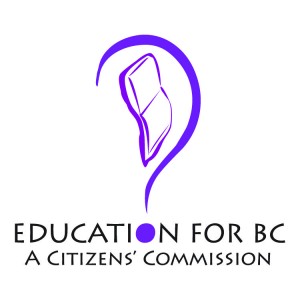
Because the current polarization in the education sector is not productive. The discussions about education in this province have devolved into ideologically formed positions and institutional battles with the result that we are not serving our children well.
The last Royal Commission on Education was held in 1988 and the world has changed since then, but these changes are not reflected enough within our education system.
During the recent job action, the BC Education Plan, a framework for planning proposed under the direction of the Ministry of Education, was politicized and the partisanship compromised the plan as an avenue for wide-ranging conversations.
I appreciate efforts such as BCEdChat on Twitter (Sunday evenings at 7:00 p.m. @bcedchat), the Ministry-led discussions around the curriculum, and many other individual initiatives meant to raise awareness of education issues. I also recognize the hard work of many other groups which have recently emerged to support public education. I hope they’ll all continue with the important work they’re doing. The more voices raised, the more they’re likely to be heard.
I also respect the work of the established groups which represent a collective voice for parents (BC Confederation of Parent Advisory Councils, BCCPAC), educators (BC Teachers’ Federation, BCTF), trustees (BC School Trustees Association, BCSTA), and others. Each organization has their own issues to address and I think they all have much to do in the future to meet the needs of their members.
Even so, it seems to me that we need to draw on a much wider circle of participation.
And that’s what I plan to do.
I want to create a forum and an arena where everyone can contribute to the discussion without having to be a member of any particular organization or having to espouse a particular outlook or perspective.
I want this to be a dialogue for all of us because the way in which we manage education affects each of us.
With this in mind, I’ve established a citizen’s commission on education. It’s a small step. One I felt I had to take because the “bigger picture” discussion about education has been lost in the turbulence of the sector over the past few decades.
This idea may work. It may not work. But I felt I had to do something to galvanize public attention and to give education in this province the attention and support it requires.
It’s time to focus the dialogue on education: what we mean by that term and what we want it to be. Then we need to let our political representatives know what it is we want from our education system. We can no longer sit back and have them tell us what education should look like because based on the evidence, their views do not seem to extend beyond the next election.
Join me in the conversation. Help me create a framework for dialogue. Visit www.EducationForBC.com and follow @edu4bc on Twitter. Help me get the talking started.
Let’s work together. Let’s make this happen for our children and for all of us.
